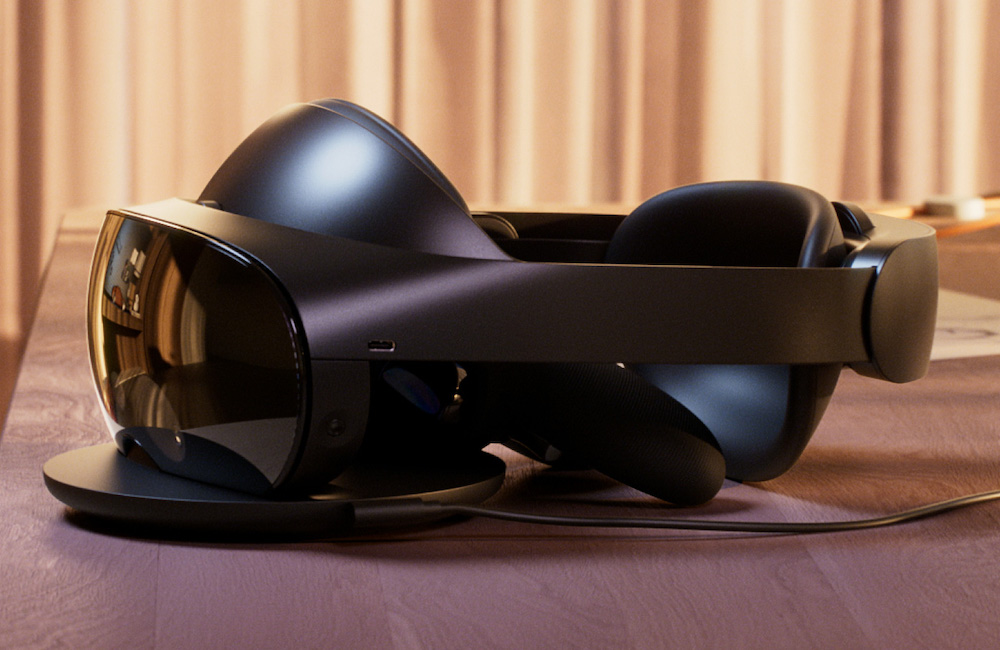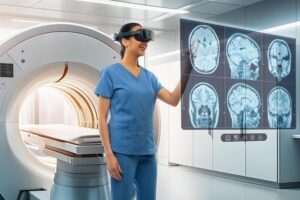Release of Meta Quest Pro Supported by Healthcare Simulation VR
The Meta Quest Pro is Meta’s most advanced headset yet and establishes a new way for users to work, create, and collaborate. The technology allows simulationists to utilize the virtual world with breakthrough high-resolution mixed reality through which they can engage effortlessly while maintaining their presence in the physical space in hi-def color. The release of the Meta Quest Pro has been supported by several healthcare simulation companies who announced they will utilize the technology to enhance their own product experiences. This HealthySimulation.com article shares more about the Meta Quest Pro and details on which clinical simulation companies offer supportive products.
Ultimately, Meta announced the launch of Quest 2 and Quest Pro at the company’s yearly Connect conference in October. The technology brings together the latest in VR to change perspectives on how users can design for physical and virtual worlds. Using the VR painting feature and various studio apps, the creative process can be taken to a whole other level.
“What if you could walk around the inside of a house or building before it’s built? Or lift a skyscraper up with one hand to examine its structural integrity? With high-resolution mixed reality passthrough, you and your colleagues can do that and more,” the product website states.
Sponsored Content:
Adding to the virtual capabilities, authentic avatar expressions mimic a user’s natural facial expressions. This is so that they can be fully present in meetings and gatherings with friends and bring more of their true personalities to life in VR. Plus, a streamlined profile and counterbalanced design combine for more comfort. The virtual world is no longer one size fits all thanks to flexible levels of VR immersion. The experience becomes even more realistic with glasses.
Meta reports that the company slimmed down the optical stack by over 40% compared to Quest 2 using innovative patented pancake lens and optics technology. This works by folding light inside the optical module and delivers 75% greater contrast with a 1.3x larger color gamut. Combine this with local dimming and quantum dot technology and VR becomes even more engaging, Meta reports. Other exciting features include:
- Backward compatibility allows users to access the Meta Quest app catalog to enjoy their favorite games, entertainment apps, and more.
- Self-tracking controllers that are balanced to hold and provide TruTouch haptic feedback, and precision pinch for fine control.
- Multiple resizable screens to organize tasks, work on new ideas, stream podcasts, news feeds, playlists, or simply message friends.
- Inclusion of Meta Quest Touch Pro Controllers, charging dock with rapid USB-C power adapter, 10 advanced VR/MR sensors, 256GB storage, 12GB RAM, and a Snapdragon XR2+ Qualcomm processor.
Meta Quest 3 to Launch in 2023
Sponsored Content:
According to an Upload VR article, the “next generation consumer Quest” will launch “later next year,” Meta’s CFO told investors. The article also reported that “Consulting CTO” John Carmack said Meta’s future headsets, presumably including Quest 3, will support 120Hz refresh rate. The exact details and features of this version of the Meta Quest have not yet been released. Meta declined to comment beyond what was said in the earnings call.
Vendor Meta Quest Pro Product Updates
PCS: PCS shared that the company’s PCS Spark will support the Meta Quest Pro thanks to the company’s implementation of WebXR – which allows for an immersive VR experience without having to download and manage a native application from the Oculus Store. As WebXR also supports AR, Spark can also support the Quest Pro’s AR functionality sometime in the future.
Lucid Reality Labs: The majority (90%) of Lucid Reality Labs’ VR experiences were developed for Meta (Oculus) platform and can be run on the Meta Quest Pro. The company already received a new device and already started test Lucid Reality Labs solutions. Furthermore, the company is planning to convert Lucid Reality Labs’ MR solution built for Varjo XR-3 to Meta Quest Pro as well.
“We will take advantage of using RGB video pass-through technology that converts Meta Quest Pro to Mixed Reality headset by utilizing both AR and VR capabilities. We already have prototypes for hybrid offline and online teaching solutions that are based on this technology. It will significantly improve collaboration opportunities in VR. One of our current MR experiences that will benefit from this feature in Ophthalmology simulation is built to educate users on macular disease syndromes and conditions” stated Lucid Reality Labs.
The company added that another great feature that will add value to the existing and future solutions is face-tracking capabilities. This capability will help to add an important emotional component to virtual teaching sessions. The users will be able to see each other facial expressions in real time and as a result, will better understand the reactions of their peers.
Lucid Reality Labs believes this feature will enable empathy an important and unique component for successful teaching. The company’s team also develops Mental Health therapeutic VR experiences and this feature will allow analyzing patients’ behavior and emotional reaction in real-time. Other features include:
Eye-tracking functionality and improved hand-tracking functionality will allow analyzing users’ behavior in VR (hit maps, spatial movements). This will help to collect advanced analytics, correct users’ actions, provide feedback, and improve learning outcomes. The new form factor makes using the headset more comfortable.
Virtual Medical Coaching: Virtual Medical Coaching apps will run on the Meta Quest Pro using either an air link or a wired connection to a computer (as the company has no immediate plans of publishing to the meta store). To take advantage of all the specific features, Virtual Medical Coaching would need to write some extra code, and their willingness to do this would depend on how well the quest pro is supported by unity and whether there are interoperability issues (like haptics on the HP reverb).
Purchase the Meta Quest Pro
Lance Baily, BA, EMT-B, is the Founder & CEO of HealthySimulation.com, which he started while serving as the Director of the Nevada System of Higher Education’s Clinical Simulation Center of Las Vegas back in 2010. Lance is also the Founder and acting Advisor to the Board of SimGHOSTS.org, the world’s only non-profit organization dedicated to supporting professionals operating healthcare simulation technologies. His co-edited Book: “Comprehensive Healthcare Simulation: Operations, Technology, and Innovative Practice” is cited as a key source for professional certification in the industry. Lance’s background also includes serving as a Simulation Technology Specialist for the LA Community College District, EMS fire fighting, Hollywood movie production, rescue diving, and global travel. He and his wife Abigail Baily, PhD live in Las Vegas, Nevada with their two amazing daughters.
Sponsored Content:




















